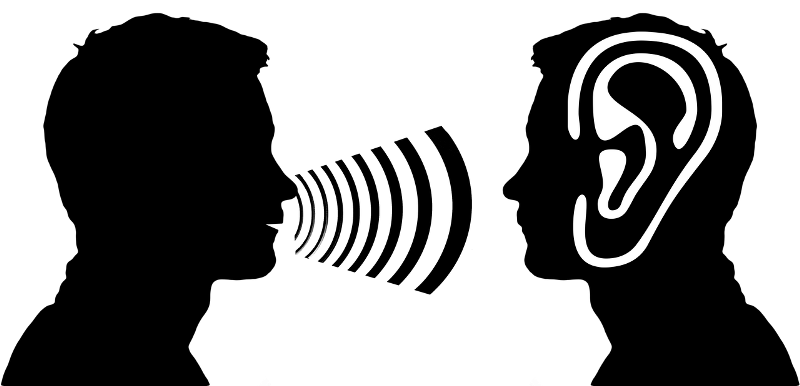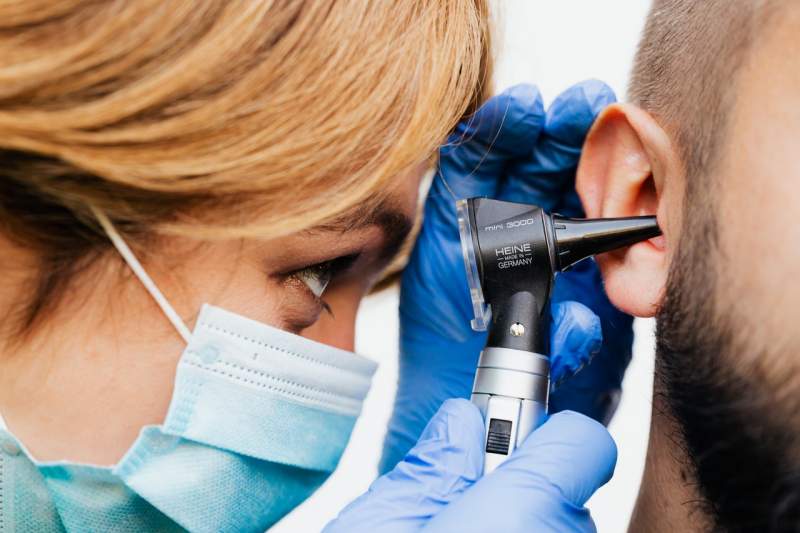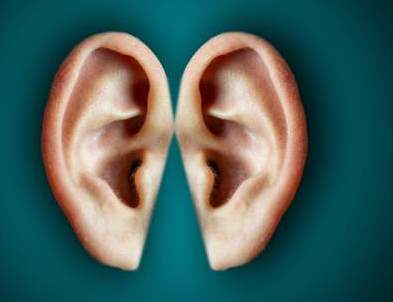A Cochlear Implant is a small electronic device that helps to restore some level of hearing by stimulating the cochlear nerve (a nerve that transmits the sound waves to the brain) by electronic pulses. It helps to provide a sense of sound to people who are profoundly deaf or have severe hearing loss from inner ear damage. It is a better option when the hearing aids are no longer helpful. This works differently than the hearing aids only amplify the sound, whereas the cochlear implant delivers sound signals bypassing damaged portions of the ear and directly stimulates the auditory nerve, unlike hearing aids.
How does cochlear implant work?

The implant has two parts, external and internal. The external part sits behind the ear and picks up sound from the environment with a microphone. The other part is placed under the skin surgically. The sounds picked up by the microphone are selected and arranged by a speech
processor. The signals from the speech processor are received and converted into electric impulses with the help of a transmitter and receiver/stimulator. A thin wire with an electrode array a group of electrodes leads to cochlear, a part of the inner ear. and collects the impulses from the stimulator. Then it sends sound information to the brain.
The sounds are not like normal hearing, it helps with an improved representation of sounds in the environment and help people to understand speech with appropriate practice and therapy.
What is the need for cochlear implant surgery?

Cochlear implant surgery helps to improve communication and also the quality of life. It can be placed in one ear, called as unilateral or both ears, known as bilateral. Bilateral implants are used more often to treat severe hearing loss on both ears, especially for infants and children who are learning to speak and process language. Children from 6 months can benefit from implants. Patients for cochlear implant surgery include those who:
- Experiencing hearing loss and not benefiting from the use of hearing aids
- Hearing with poor or improper clarity
- Inability to hear speech without reading lips even when wearing budget friendly hearing aids
Cochlear implant surgery have been reported to improve responses such as:
- Good hearing ability without lip-reading
- Recognition of environmental sounds
- Able to listen even in noisy surroundings
- Ability to find the source where the sound comes from
- Capability to hear music and telephonic conversation
How to prepare for Cochlear Implant surgery?

During this procedure, the patient is sedated or under short anesthesia. This means the patient will be unconscious during this implant surgery. The patient needs to avoid certain medications or supplements for a certain period. Eating and drinking should be avoided for a certain time before the procedure. The doctor will give all specific instructions to the patients to prepare.
What to expect in Cochlear Implant Surgery?

Before the procedure:
It is important to determine whether the cochlear implant is a good option and need a detailed medical evaluation for both adults and children. The evaluation is conducted by a doctor or clinic which includes:
- Ordering tests to determine hearing, speech and occasionally balance
- A physical examination to assess the health of the inner ear
- MRI or CT imaging tests of the skull to assess the condition of the inner ear structure and cochlea
- Mental health or psychological testing are done in rare cases to determine the ability to learn
During the procedure:
A cut or incision is made behind the ear by the surgeon and a small hole is generated in the mastoid, a portion of skull bone where the internal device is placed. A small opening in the cochlea is created to thread the electrode of the internal device. Then the skin incision is closed by stitching that keeps the internal device under the skin.
After the procedure:
The patient might experience dizziness or nausea and discomfort or pressure over the implanted ear. Most of the patients might get discharged from the clinic on the same day or the next day after surgery. The cochlear implants might not be activated by an audiologist for about two to six weeks to give time for healing.
Activation
There are procedures to activate the implants by an audiologist that include:
- The sound processor is adjusted to fit the patient
- The components of the cochlear implant must be checked to make sure they work
- Determine the sounds what the patient need to hears
- Give the patient information on the proper care and use of the device
- Set the device so that the patient can hear the best of their ability
Rehabilitation
To understand sounds heard through the cochlear implant, the brain is trained through rehabilitation and therapy. Training to differentiate the Speech and everyday environmental noises from what the patient remembers. Some time is needed for the brain to recognize what these sounds mean. This is an ongoing process, and wearing the speech processor continuously during waking hours helps to achieve the best.
Results:
Results of cochlear implant surgery may vary from person to person. Some of the main factors that can influence the outcomes of cochlear implantation include,
- The age when the hearing was lost
- The time gap between hearing loss and cochlear implant surgery.
For children, getting a cochlear implant surgery at a young age generally produces the best results. For adults, a shorter period of profound hearing loss before cochlear implantation generally produces the best results. Adults who have more experience with sound tend to benefit more from cochlear implants. Cochlear Implant in Turkey produces the best results.
Reference:
